|
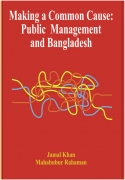 |
||||||||||||
Making a Common Cause: Public Management and BangladeshMaking a Common Cause: Public Management and Bangladesh pursues a management approach to the country’s public sector, situates public management in a context of underdevelopment, systems theory and mobilization, underwrites that management is not only instrumentalist but also essentialist, and humanizes and opens the public domain. Paralleling this strand, several research issues – development, management and populism – are trailed, which are, in many respects, empowerment issues. With Bangladesh morphing through fragile, and yet challenging time, where neither publicness nor management is appreciated as expected, the multifacetedness of public management as a discipline and as a profession serves as an enabler and as a bulwark. By focusing on social policy, industrial policy, agricultural development, economic development, energy regulation, telecommunication regulation and managerialization, and conducting a focus group survey and presenting survey evidence, an effort is made to make people, customers, organizations, media and decision-makers genuinely excited about public sector and country development, dispel the misgivings that public management is trite, humdrum and mirthless, and posit that management is not only about power, authority, control and regulation but also about growth, development, distribution, fairness, access, representation and participation. Going still further, appropriate policies, faster decisions, proper resource allocation, competent personnel, timely output generation and delivery, regular enforcement and capable implementation, effective monitoring and evaluation, continuous measurement and quantification, authentic communication and wide-ranging dissemination, relevant education and training, meticulous accountability and transparency and periodic reform and renewal provide some of the sturdy bastions of public management in the country. While analysis pulls together the discourse, brings up analytical issues that are germane to the theory and practice of public management in Bangladesh and speaks not only to the challenges but also the promises of development, management, populism and empowerment, findings accent the misuse and underutilization of public management in the country’s organizational approaches. Synergistic tenor, resolute leadership, correct policy decisions and a systemically-configured management system can go a long way to improving the existing managerial and operational flaws. The work takes a stand against self-colonization and dependency, self-devouring practices, lethal partisan rancour, outrageous gaffs, outlandish behaviour, boorish skulduggery, a vertiginous rise of dysfunction and all the perfidy and indifference of the elite groups. For millions in the country, some public sector interactions and experiences are like a bad meal which takes long to digest and even longer to forget, making people look for a break. |
|
 |
||||||||||||
বà§à¦¯à¦¾à¦·à§à¦Ÿà¦¿à¦• অরà§à¦¥à¦¨à§€à¦¤à¦¿à¦° রূপরেখা ও পà§à¦°à§Ÿà§‹à¦—বà§à¦¯à¦·à§à¦Ÿà¦¿à¦• অরà§à¦¥à¦¨à§€à¦¤à¦¿à¦° মূল পà§à¦°à¦¤à¦¿à¦ªà¦¾à¦¦à§à¦¯à¦•à§‡ à¦à¦‡ বইটিতে উপযà§à¦•à§à¦¤ যৌকà§à¦¤à¦¿à¦• কাঠামোয় সহজবোধà§à¦¯à¦à¦¾à¦¬à§‡ বà§à¦¯à¦¾à¦–à§à¦¯à¦¾ করা হয়েছে। বিষয়à¦à¦¿à¦¤à§à¦¤à¦¿à¦• বিশà§à¦²à§‡à¦·à¦£ ও উপসà§à¦¥à¦¾à¦ªà¦¨à¦¾à¦° বিনà§à¦¯à¦¾à¦¸ à¦à¦®à¦¨à¦à¦¾à¦¬à§‡ করা হয়েছে যে, à¦à¦¤à§‡ বিà¦à¦¿à¦¨à§à¦¨ অনà§à¦ªà§à¦™à§à¦– নিজেদের বৈশিষà§à¦Ÿà§‡ à¦à¦¾à¦¸à§à¦¬à¦° থেকেও বিষয়বসà§à¦¤à§à¦° অখনà§à¦¡ চিতà§à¦°à¦Ÿà¦¿à¦•à§‡ মà§à¦²à¦¾à¦¨ করেনি। আলোচনা মূলত: ততà§à¦¤à§‡Â¡à¦° উপর হলেও à¦à¦¤à§‡ অনেক পরিচিত সমসà§à¦¯à¦¾à¦° বিশà§à¦²à§‡à¦·à¦£à§‡ বà§à¦¯à¦·à§à¦Ÿà¦¿à¦• অরà§à¦¥à¦¨à§€à¦¤à¦¿à¦° নীতিমালার পà§à¦°à§Ÿà§‹à¦— দেখানো হয়েছে, যা তাতà§à¦¤à¦¿Â¡à¦• বিশà§à¦²à§‡à¦·à¦£à§‡à¦° বোধগমà§à¦¯à¦¤à¦¾à¦•à§‡ গà¦à§€à¦°à¦¤à¦° করবে। আলোচনাকে পà§à¦°à¦¾à¦¥à¦®à¦¿à¦• সà§à¦¤à¦° থেকে শà§à¦°à§ করে কà§à¦°à¦®à¦¾à¦¨à§à¦¬à§Ÿà§‡ উচà§à¦šà¦¤à¦° পরà§à¦¯à¦¾à§Ÿà§‡ নিয়ে যাওয়া হয়েছে। à¦à¦° ফলে উচà§à¦šà¦¤à¦° সà§à¦¤à¦°à§‡à¦° ছাতà§à¦°à¦›à¦¾à¦¤à§à¦°à§€à¦¦à§‡à¦° পà§à¦°à§Ÿà§‹à¦œà¦¨ মেটানো ছাড়াও অনà§à¦¸à¦¨à§à¦§à¦¿à§Žà¦¸à§ সাধারণ পাঠকের নিকটও বইটি গà§à¦°à¦¹à¦£à¦¯à§‹à¦—à§à¦¯ হবে। নতà§à¦¨ শৈলী ও আঙà§à¦—িকে বাংলা à¦à¦¾à¦·à¦¾à§Ÿ রচিত à¦à¦‡ বইটি সংকà§à¦·à¦¿à¦ªà§à¦¤ পরিসরে বà§à¦¯à¦·à§à¦Ÿà¦¿à¦• অরà§à¦¥à¦¨à§€à¦¤à¦¿à¦° à¦à¦•à¦Ÿà¦¿ পূরà§à¦£à¦¾à¦™à§à¦— পরিচয় পà§à¦°à¦¦à¦¾à¦¨à§‡à¦° পà§à¦°à§Ÿà¦¾à¦¸à¥¤ |
|
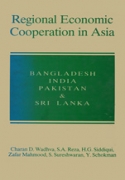 |
||||||||||||
Regional Economic Cooperation in AsiaOne important element in the quest for a New International Economic Order being formulated under the aegis of UNCTAD is promotion o collective self-reliance among the developing countries, or what is known as ‘South-South Economic Cooperation’. The studies in this volume constitute a pilot effort by a group of Asian scholars in exploring ""South-South Cooperation" by analysing the nature and potential of regional and sub-regional cooperation in trade and joint ventures in Asia. In addition to the Overview contributed by the project coordinator, this survey includes country studies on Bangladesh, India, Pakistan and Sri Lanka. |
|
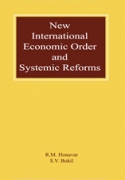 |
||||||||||||
New International Economic Order and Systemic ReformThe book begins with an analysis of the NIEO reforms agenda. The authors find that this is a middle-of-the-road programme, and implies no design to destabilise the conservative thinkers in the North. Moreover, the programme does not contain any radical redistributive demands to dispossess the richer countries of their affluence. Even then the North-South dialogue has reached a stalemate due to unfounded fears and lack of bargaining leverage with the South. As a way out, the authors believe that focusing attention on systemic reforms may lay the basis for a new international economic order. A powerful case, based on mutual gains, is made out for a set of systemic reforms in the areas of international liquidity, exchange rates, aid and credit flows, debt relief, and the IMF conditionality. Systemic reforms are possible if we grasp the principles behind international cooperation. The authors believe that India can play an active role if she modifies her negotiation strategies. |
|
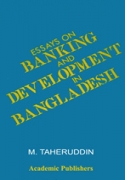 |
||||||||||||
Essays on Banking and Development in BangladeshThe essays included in the volume deal with diverse issues of banking and finance and have the touch of reality emanating out of insight in practical problems. |
|
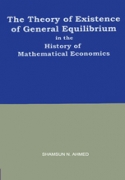 |
||||||||||||
The Theory of Existence of General Equilibrium in the History of Mathematical EconomicsThe book ‘The Theory of Existence of General Equilibrium: In the History of Mathematical Economics’ focuses on the nature of different paradigms involved in the development of the existence of general equilibrium during 1838-1976. It examines the factors which led the general equilibrium theorists to develop the model of existence of general equilibrium: the individuals responsible for identifying the problem associated with the earlier general equilibrium theory; the link between the earlier and the modern theory of the existence of equilibrium: the individual or group who developed the first existence proof; the contributions of the modern existence theorists of general equilibrium; the approach which finally did emerge. This book reveals how the proofs of existence of competitive equilibrium system have been modified by developments of appropriate mathematical techniques. |
|
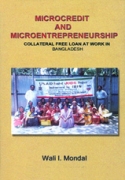 |
||||||||||||
Microcredit & Microentrepreneurship Collateral free loan at work in BangladeshBangladesh in the leader of collateral free microcredit model. More than 25 million poor people from over 50 countries of the world are benefiting from microcredit.. There was, however, a void in microcredit literature about its origin. Collateral free microcredit dates back to 1905 when Rabindranath Tagore founded kaligram Krishi Bank in Patishar in the district of Naogaon. This book traces the events leading to the establishment of kaligram Krishi Bank by poet Tagore who was the landlord of Patishar area. The microfinance institutes (MFIs) of Bangladesh are unique in that they work as bankers to the poor but they are not banks. The MFIs are part of the Nongovernmental Organizations (NGOs) providing a variety of loan products to the poor people according to the missions of their parent NGOs. The book analyzes the oligopoly in the microcredit market of Bangladesh. The book also evaluates the contributions of microcredit industry in Bangladesh in non-technical terms. |
|
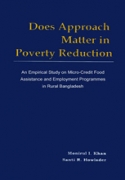 |
||||||||||||
Does Approach Matter in poverty ReductionIn this book the readers will find a result of a comparative study on the effect of three very significant poverty reduction programmes in rural Bangladesh. The selected programmes included micro-credit, food assistance and the employment to the women commissioned by ASA, CARE-GOB and the BRAC-GOB through the local body of Union Parishad. The latter two are popularly known as the RMP and IGVGD programmes. |
|
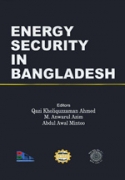 |
||||||||||||
Energy Security in BangladeshEnergy is a strategic determinant of economic and social progress. Bangladesh is currently unable to ensure necessary energy supplies to meet the energy demand of the country. Moreover, the gap between energy demand and supply in the country is widening. While demand is increasing as a result of economic, social, and technological expansion, the supply remains sticky, It is therefore, essential to take steps ensure necessary energy supplies and their proper distribution to all uses and users throughout the country to support steady socio-economic development in the country. The papers included in this book have addressed all aspects of energy security in the country, providing insights into the present status and guidelines for future action, Both the problems faced and the existing and emerging possibilities that may be tapped to improve the energy supply and distribution situation have been investigated. The book provides essential policy guidelines concerning energy security for Bangladesh. |
|
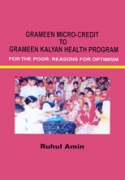 |
||||||||||||
Grameen Micro-Credit to Grameen Kalyan Health Program |
|
 |
||||||||||||
Intellectual Property Rightss and Foreign DirectGiven a different structure of demand for Intellectual Property Rights (IPR) protection under the Trade Related Aspects of Intellectual Property Rights (TRIPS) mandate (geared toward the developing world to comply with the minimum protection criterion as opposed to a too stringent and weak IPR system, especially using the Agreement’s flexibilities for implementing TRIPS considering a developing country’s legal framework and other socio-economic conditions for attracting FDI), this research essay has investigated how an adequate IPR protection mechanism under the framework of TRIPS can augment FDI from a developing country’s perspective. The basic theme advanced throughout this essay is that developed countries should exercise greater tolerance and flexibility to help developing countries comply with the TRIPS mandate of adequate IPR protection toward the generation of greater FDI in the emerging economies, and help reach a common platform on global IPR protection, which would be beneficial for both parties’ in the long-term. In this context, developed countries should extend their cooperation by means of monetary and technical assistance and offer greater flexibility to help developing countries reform their domestic IPR regimes, which include (a) building a consensus for IPR reform (b) administration and judicial reform (c) administration and enforcement of IPR so that developed countries feel more secure to invest in developing countries, which could potentially increase foreign investment. |
